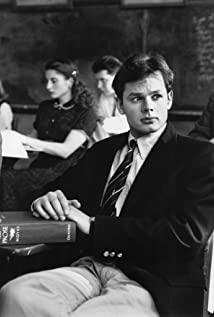A certain rabbit sister’s German interpretation of Schiller’s lyrics:
"Freude is joy, schöner is an adjective, beautiful, and Götterfunken is a composite ranking. The preceding Götter means the gods. In German, God is Gott (equivalent to the English God , The plural form is Götter=Gods, but when using plurals, in most cases, it does not necessarily refer to God. It needs to be combined with the context. The second half of Götterfunken means spark. So, the literal translation should refer to The beautiful sparks of the gods. As for the translation of the "Goddess of Joy" used in the mainland, it is a bit over translated from the perspective of translation. The words of the goddess should be Göttin, plural Göttinen, and German pays much attention to part of speech, words It is obvious that it is male and female, so it is obvious. "
The history of Beethoven’s beliefs should be a history of reformation. From the essence of music, I think Beethoven is a person who returns to God. (He is a demand Reconciliation with God and man?) Yes, I think it is. Tang Chongrong is wrong to criticize Beethoven. He doesn't understand music at all, and he doesn't understand Beethoven! He criticizes him only on the basis of the words "Goddess of Joy". I don't know the translation of the German lyrics you said, but starting from the music itself, I believe that he is a man who reconciles with God.
Beethoven, the brightest name of the 19th century. In the eyes of Beethoven, the politics, science, and religion that are surging in the times can be detached. Beethoven belongs to the freedom, democracy, emancipation, struggle, kindness, humanism, anti-religion that shouted in the 19th century...He has the most moving pride and elegance in the classics, as well as the reflection and abstraction of the origin of romanticism; Beethoven let his contemporaries All of the musicians and politicians in the world are dwarfed, and they are beyond the reach of the followers of the 21st century! His nine symphonies are the summary of his life, praised the violent revolution full of idealism third, protested against fate, cursing life fifth, sweet sixth, tragedy but relieved seventh, need reconciliation, forgiveness of sins The ninth. This is his life, and it is also the eternal theme of mankind's destiny and heaven and earth.
Beethoven hated all hypocrisy and emptiness in a country where Catholicism was prevalent; he screamed and cursed all feudal and religious dictatorships in the sky and sorrow; he walked around outside the church, but he was smashed before his death. The Catholic priest who walked with holy water to listen to his confession. Yes, he thinks the priest is a wall of hypocrisy between him and God! He could not avoid the abuse and ridicule of the world, and simply dealt with everyone with crazy indifference; only in music, he became the master of his life and the person who subjugated the whole world; he greedily robbed the happiness of his relatives in order to Let your own business inheritance. This rebellious and treacherous child can only pick up his humility in the majesty of the heavenly Father and sing laughter and weep for his own kind.
The narrative style of the film is very different from other art films. Recall Beethoven's several women before his death. The mysterious love letter with no specific recipient’s name was used to concatenate the lawyer’s experience. Take me into the gentle and surly side of Beethoven. So many people actually love him, but Beethoven is as naive as a wayward child, who has never faced people's love... His life is so lonely, yet so gorgeous.
The beautiful music and the plot complement each other. The first funeral was "Miss", which exaggerated the quietness of the funeral.
When talking about the first woman that Beethoven loved, the second background music that appeared was a piano sonata that I could not remember, and it might be the second movement of the moonlight. The notes are full of the musician's deep love, constantly overflowing from the keys. Even if it is the nobles' poison and contempt for him in the movie. But it seems that Beethoven's love for this ruthless world makes us bystanders feel the emotional tension in the strong contrast.
The third song is the first movement of the third symphony "Hero". This symphony is rumored to be written to Napoleon, just like the "Liberal" the nobles cursed in the movie, he sang the French democratic pioneer with enthusiasm, but the reality is like a joke, Napoleon became Emperor, I was so angry that Lao Bei used a knife to scratch off the title on the score... It also seems that Lao Bei gave the proud lady Juliet a hard hit on the back of the hand in the movie. This movement has two accents as the introduction, and the first one is started. theme. Go straight, like the composer's own young character! Then the notes are interspersed among the many instruments-like the rampant love between Lao Bei and Juliet in the movie... This director, awesome! !
As Juliet's father talked to his daughter, the terrible facts about Beethoven's bad character and progressive deafness. The restless piano takes the audience to review the tense relationship between Beethoven and his brothers. Unfortunately, I don't know which sonata is the subject of this piano.
Then Juliet and his daughter asked Beethoven to test the piano for the new piano (in fact, I wanted to see if Lao Bei was deaf). In an unmanned room, Beethoven played "Moonlight" with his ears close to the closed piano surface, even a musical idiot. Juliet was also moved by the music of the flowing water and the beautiful love. She walked quietly to Beethoven's side, and gently put her hand on Beethoven's shoulder... However, Beethoven who was deaf was found to be furious, he jumped up like a spring of pride, angrily rushed out the door...
Then It's another string quartet (very familiar, but I don't know which one, it should be an early work, very lively). The movie describes the tense relationship and the final collapse between him and his brother for a woman. This also laid a footnote for Beethoven's loneliness throughout his life. I don't know when the four violins will turn into a violin concerto. The theme of music is closely tied to the plot of the movie. The description of Beethoven's taking the police to check the bedroom of his brother and his slutty sister-in-law is vivid.
Next is the embarrassing scene of Beethoven's deafness being discovered in the performance of the "Fifth Piano Concerto". Lao Bei, who was excited by the Allegro theme of the first movement, left the piano seat, waved his arms, and directed the orchestra indiscriminately. People's laughter alternated with the director's intentional silent processing. I can also feel the pain, such a genius, but the hearing is taken away by God alive, this terrible fact is not in exchange for sympathy and understanding, but it is the ridicule of those shallow, ignorant and arty villains. For Beethoven, how unwilling it is. In later generations, this most famous Fifth Steel Association has become the worst nightmare of the author's own life.
That great woman walked out of the frantically laughing audience, supported Beethoven with respect, and walked into the second movement of the Fifth Steel Association. The piano was quiet, and the strings sounded softly, accompanied by the two. A proud and beautiful soul walked out of people's sight. When the piano reappeared, he was no longer excited, but he was also tender and contemplative, walking along with the feminine string music... The adagio in the second movement was full of romance and inspired countless musicians later. . Just like a wounded child, the wound was gently bandaged by the woman.
However, as Napoleon's artillery fire approached, the first movement of the Fifth "Fate" symphony, the famous to death theme sounded! Killings, rapes, hatreds...Beethoven also wrote the pain of disillusionment of his ideals and the country into music. Lao Bei returned to the second woman, and the sad violin sonata sounded, carrying the sweetness and hope of their love in pain. They are walking in the grassy field, how I really hope they can live together from now on... (I can't find which violin sonata it is, it sounds like it's almost the same).
Next up is "Krotze", a violin sonata about spring. The film lines talked about Beethoven's own overbearing of music: "People can only follow my music thinking, the audience has no right to choose...that is, I want to reach the heart of a woman." Yes, this is the magic of Beethoven. In the ups and downs of the beautiful violin, I have no right to choose...I am sad for him and happy for him. I don't have to choose anything, even if his humanism is the devil or the messenger of God, I will never hesitate to hesitate! Ah, God has mercy on my weakness.
The next paragraph, I don't understand, it is Capsar who died. This person seems to be Beethoven's brother, crazy! I can't think of this symphony. Maybe the eighth? Beethoven forcibly seized the custody of his nephew...Oh my God, the devil! The overbearing devil,
Lao Bei ...Being the nephew of Lao Bei the devil is not easy. The mediocre he was finally destroyed to the point of suicide... The director inserted a fragment of "To Alice" here, which seems to be teasing the current piano enthusiasts and mediocre aptitude. The
plot details about Beethoven's contention for this. A series of means for nephew raising and education rights. I looked a little depressed. Because there is no English subtitles, I have read it hastily, so I don't want to go into it. Helplessly, the devil's nephew finally collapsed and was about to commit suicide. In the background music is the second movement of Beethoven's seventh symphony. It is also a very classic section. In the film, this deadly theme seems to appear three times, all related to this poor nephew.
The last is the Ninth Symphony. Like all the great men in the world, those in their later years have a perfect account of the world. This is Bei Jiu... Bei Jiu that I am going crazy for! The director here left the most brilliant interpretation of Beethoven in film history. This kind of interpretation of Lao Bei's life's battle is none other than Bei Jiu! ! ! The child under the stars who was tortured by his violent father is the communication between himself and the world in Beethoven's memory. This communication is a world where there is no beating, insults, or ridicule, no one else...only the communication between Beethoven himself and God. Let all the people's clamors go to death. He ran under the night sky, took off his shirt and lay down in the clear water. Unclear whether it was the reflection of the light or the starlight, he turned Beethoven himself into a little stardust. The powerful march and chorus take us, take Beethoven, and seek a way to reconcile with the world.
Everyone in the audience stood up and applauded, and the world and his long-standing grievances were finally wiped out here. The music is so great. Just like Beethoven himself said, he used music to conquer the world... The
final chorus: (quoted from Schiller's poem)
Hug, millions of people!
Kiss the whole world.
Brothers, the end of the interstellar is our loving almighty father,
ah millions of people, can you kneel in front of him?
Do you feel he is with you ? Go
to the end of the interstellar to find him, he must live The end of that interstellar.
Beethoven extols not only freedom and equality, but our Father God in heaven. Without such a touch from the ultimate, how to leave the ultimate music! ? Music is not just Beethoven's, it's God-given! ! !
At the end of the film is the second movement of the Fifth Steel Association. People and the director recalled the plot of Beethoven's loss of love. The rain is pattering, and the sentiment is bleak. Beethoven took away his deep love and left an unprecedented musical heritage. When the glorious Allegro, the third movement, is played, it is the end of the film. This movement is probably not only Beethoven's summary of himself, but also represents the world's attention to this genius.
View more about Immortal Beloved reviews











